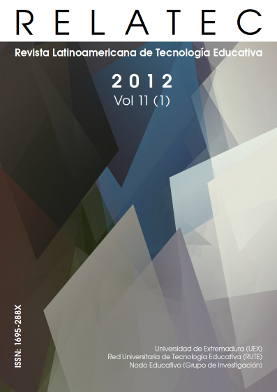Ética y brecha digital como un problema educativo en un programa de formación de posgrado para educadores. Estudio evaluativo
Keywords:
Educación Moral, Formación del profesorado, Práctica profesional, Educación Secundaria, Uso educativo de InternetAbstract
El objetivo de este estudio de investigación etnográfica y evaluativa es conocer la perspectiva ética del docente de Secundaria participante en un posgrado de tecnología educativa sobre los usos juveniles de Internet, así como su perspectiva sobre la sociedad de información y los medios de comunicación. Nuestro marco teórico forma parte de la corriente sobre Enseñanza de ética para estudiantes de ciencias e ingeniería y la teoría de la ética de la tecnología educativa experimentada por los técnicos profesionales. Nuestras preguntas clave se refieren al papel de la cultura digital en la vida de los docentes; la alfabetización digital entre sus estudiantes; el lugar concedido a la alfabetización informática en la enseñanza que practican y la apertura para trabajar en colaboración con otros profesores y estudiantes. La metodología utilizada han sido técnicas de investigación biográfica-narrativa y etnografía basada en evidencias obtenidas en portafolios y un foro. Entre los resultados se observan discrepancias entre una apropiación personal de la red y la que toleran a sus estudiantes, y una resistencia al cambio. Entre las conclusiones se extrae que adoptar una perspectiva ética es un espacio tan conflictivo como la propia Educación Secundaria, particularmente en los centros sostenidos con fondos públicos con sus tasas de fracaso y su multiculturalidad vividos como fatum.
The objective of this ethnographic and evaluative study is to understand the ethical perspective of secondary teachers participating in a educational technology Postgraduate on Educational use of internet and its own perspective on the information society and media. Our framework is part of the current on ethics education for students in science and engineering and the ethics of instructional technology and issues and coping strategies experienced by professional technologists. Our key questions concern the role of digital culture in the lives of teachers, the digital literacy among its students, the place given to digital literacy as practitioners, and openness to work collaboratively with other teachers and students. The methodology used was narrative biographical research techniques, and ethnographic evidence-based through portfolios and forum. Among the results was showed discrepancies between personal appropriation of the net, tolerance to their students and resistance to change. Among the conclusions drawn that to adopt a ethical perspective was contentious as secondary education, particularly in publicly funded schools with their rates of failure and multiculturalism experienced as fate.
Downloads
Downloads
Published
Issue
Section
License
Authors who publish in this journal accept the following conditions:
1. The Author retains copyright in the article. Upon acceptance of the article, the author shall grant to the Publisher the right of first publication of the article. with the dcoument registered with the Creative Commons Attribution-NonCommercial-NoDerivative 4.0 International (CC BY-NC-ND) license, which allows to third parties to use what is published whenever they mention the authorship of the work and the first publication in this journal.
2. Authors can make other independent and additional contractual agreements for the non-exclusive distribution of the article published in this journal (eg, include it in an institutional repository or publish it in a book) provided they clearly indicate that the work was published for the first time in this journal.
3. Authors are allowed and recommended to publish their work on the Internet (for example on institutional or personal pages) before and during the review and publication process, as it can lead to productive exchanges and a greater and faster diffusion of published work (see The Effect of Open Access).









